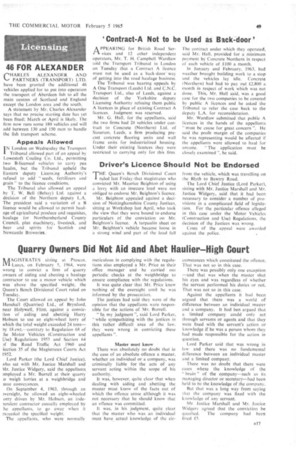Quarry Owners Did Not Aid and Abet Haulier—High Court
Page 51

If you've noticed an error in this article please click here to report it so we can fix it.
l‘AAGISTRATES sitting at Prescot. al Lanes, on February 5. 1964, were wrong to convict a firm of quarry owners of aiding and abetting a haulage contractor to use a motor vehicle which was above the specified weight, the Queen's Bench Divisional Court ruled on Tuesday_
The Court allowed an appeal by John Henshall (Quarries) Ltd., of Brynford. near Holywell, Flint, against a conviction of aiding and abetting Harry Hobson to use an eight-wheel lorry of which the total weight exceeded 24 tons— by 18 cwt.—contrary to Regulation 68 of he Motor Vehicles (Construction and Use) Regulations 1955 and Section 64 )f the Road Traffic Act 1960 and section 35 of the Magistrates Courts Act 1952.
Lord Parker (the Lord Chief Justice), oeto sat with Mr. Justice Marshall and Mr. Justice Widgery, said the appellants employed a Mr. Burrell at their quarry :o weigh lorries at a weighbridge and ssue conveyances.
On September 4, 1963, through an wersight, he allowed an eight-wheeled orry driven by Mr. Hobson, an indelendent contractor casually employed by he appellants, to go away when it exceeded the specified weight.
The appellants, who were normally meticulous in complying with the regulations also employed a Mr. Price as their office manager and he carried out periodic checks at the weighbridge to ensure compliance with the regulations.
It was quite clear that Mr. Price knew nothing of the oversight until he was informed by the prosecution.
The justices had said they were of the opinion that the appellants were responsible for the actions of Mr. Burrell.
"In my judgment ", said Lord Parker, "while sympathizing with the justices in this rather difficult area of the law. they were wrong in convicting these appellants".
Master must know There was absolutely no doubt that in the case of an absolute offence a master. whether an individual or a company, was criminally liable for the acts of any servant acting within the scope of his authority.
It was, however, quite clear that when dealing with aiding and abetting the master must know of the facts out of which the offence arose although it was not necessary that he should know that an offence was committed.
It was, in his judgment, quite clear that the master who was an individual must have actual knowledge of the cir
cumstances which constituted the offence. That was not so in this case.
There was possibly only one exception —and that was when the master shut his eyes and was regardless of whether the servant performed his duties or not. That was not so in this case.
Against the appellants it had been argued that there was a world of difference between an individual 'master and a company, It had ben argued that a limited company could only act through servants or agents and that they were fixed with the servant's action or knowledge if he was a person whom they had made responsible for the action in question.
Lord Parker said that was wrong in law and there was no fundamental difference between an individual master and a limited company.
There was no doubt that there were cases where the knowledge of the brain" of the company—such as its managing director Or secretary—had been held to be the knowledge of the company.
But that was a long way from saying that the company was fixed with the knowledge of any servant.
Mr. Justice Marshall and Mr. Justice Widgen, agreed that the conviction be quashed. The company had been fined £5.


















































































































































































